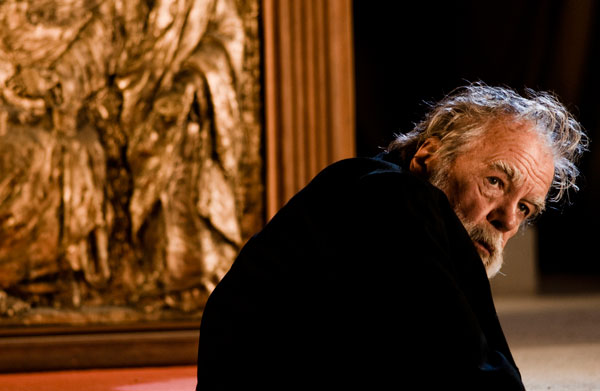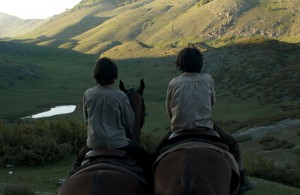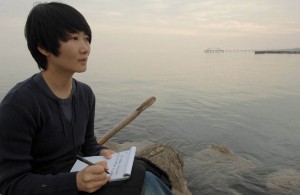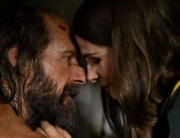
Michael Lonsdale as the priest in THE CARDBOARD VILLAGE (The Film Society of Lincoln Center)
This year’s Open Roads: New Italian Cinema opens on the same weekend in New York as Alice Rohrwacher’s audacious debut, Corpo Celeste. Through the perplexed eyes of a 12-year-old girl on the verge of her confirmation, the director questions what it means to be a Christian and the values of contemporary Italians, who are out of touch with their historical past, media-obsessed, and materialistic—everything, and I mean everything, is disposable. It won acclaim last year at Cannes and at the New York Film Festival, the latter presented by the Film Society of Lincoln Center, as is this annual series, a variety program of art films, mainstream fare, and one nutso midnight movie.
In this mini-festival, only Ermanno Olmi’s somber The Cardboard Village matches Rohrwacher’s wide purview. Now in his sixth decade as a filmmaker, he remains as relevant as his contemporaries Bernardo Bertolucci and Marco Bellocchio, His breakthrough film, 1962’s Il Posto, is as influential as any film made in that decade for its simplicity and pseudo-documentary approach. Here he certainly has captured the tenor of the times. His new film premiered at the Venice Film Festival within days of the Occupy Wall Street movement, and, in the spirit of the times, you’ll hear a variation of OWS’s message in the words of an African illegal alien: “The wealth of the few is paid by the poverty of the many.”
Like Rohwacher, Olmi questions the historical role of the Church, by beginning with a demolition crew removing statues, paintings, and the large crucifix hanging high above the altar from a condemned church. One frail priest (Michael Lonsdale, dubbed) resists the closure; the parish has been his only home since his ordination. During the following rainy night, more than a dozen African immigrants slip into the building seeking sanctuary from law enforcement (gun shots sound off outside in the distance).
Olmi sounds off a call to action rather than delivering a character-driven message, even with a young, unmarried woman about to give birth and a wounded man in need of medical care among the shelter seekers. Instead he focuses on ideas or symbols—at one point, the immigrants use a baptism font as a bucket under a leaky roof. And in the case of the priest, he talks out loud to keep himself company, working out his crisis of conscience. However, all of the film’s deliberations lower the tension to the tone of a debate, lacking any spontaneity.

The two young brothers in the beginning of HORSES (The Film Society of Lincoln Center)
And speaking of Olmi, one film brings back the sociological and rustic tone of perhaps his most famous film, The Tree of the Wooden Clogs—Horses, the most engaging film in a sampling of half of this series. It’s as fleet and suspenseful as when I saw it months ago at the Santa Barbara International Film Festival—a beautifully filmed and sentimental period piece with a quickening pulse. Set around 1900 in northern Italy, two impoverished and close brothers take divergent paths to adulthood: the eldest, a skirt-chasing dandy always looking beyond the horizon; the younger, a virginal straight arrow. It sort of feels like a Western, with its open vistas, vengeful cattleman, dangerous mountain trails, two hiss-worthy villains, and one heck of a showdown. Director Michele Rho has breathed new life into the genre.
From just a random perusal of Open Road offerings, one theme is apparent that one theme weaves in and out of many of the films: the changing face of Italy. There are at least three more works that take the issue of immigration head-on, and they couldn’t be more different from each other. In Là-bas: A Criminal Education (with an emphasis on the subtitle), Yssouf, an Ivory Coast immigrant and observant Muslim, quickly learns that the way to a fast euro is through drug trafficking. It’s a little like De Palma’s Scarface, though on a much lower scale and without the blood splattering. Maybe Maria Full of Grace, with its drug mules, is a better comparison. Director Guido Lombardi refrains from the sensational, though you might wince when Yssouf slaps on the gloves to dig out a bag of cocaine from a toilet. Even though the setting is quite specific, we’ve all seen the rube-seduced-by-money-only-to-regret-it before. Lombardi’s cast includes non-actors, and sometimes it’s apparent.

Tao Zhao as Shun Li (Photo: Simone Falso)
For a mellower tone and a less predictable film, see the quietly moving and unassuming Shun Li and the Poet, the first feature by Andrea Segre. As the eponymous character, actress Tao Zhao won the best actress David (Italy’s Oscar, more or less) as a 30-something Chinese illegal immigrant in debt to the local Chinese racket, who paid for her passage. You see Italy through her eyes, and in this case it’s the island town of Chioggia in the Venice Lagoon. (Yes, armchair travelers, tired of Piazza San Marco? This one you’ll devour.) The poet of the title, the rhyming Beppi, originally came from the former Yugoslavia 30 years earlier. He’s one of the gang of older fishermen who hang out at the bar where Shun Li works, but the townies and Shun Li’s boss squirm when they notice that she and Beppi have struck up something more than just a friendship—xenophobic fear takes over.
If the reports of Michael Haneke’s new film Amour are true, that he has made a softer, deeply felt marital drama as opposed to something unsettling, then the directing team of twin brothers Gianluca and Massimiliano De Serio aptly fill that void with their unflinchingly stark and harsh first film, ironically called Seven Acts of Mercy. It begins following a young woman as she washes up in a public bathroom, waits at a bus station, and, crouching between cars in a parking lot, empties the contents of a purse she’s just stolen, the loot going towards for a forged ID card—she’s Romanian living in quasi-captivity in a Turin encampment. To come up with more cash, she resorts to committing at least three crimes, including assaulting a frail, dying man in his eighties. Only redemption can follow (think the Dardenne brothers, but with less defined characters.) The tone’s so austere that it’s nearly dialogue-free. Guarded and blending into the background, the pale woman’s emotionally dead behind the eyes for most of the film. Furthering the irony, her name is name Luminita.

Vincent Gallo saluting his interplanetary friends (The Film Society of Lincoln Center)
How you respond to Davide Manuli’s wacko twist of Werner Herzog’s The Enigma of Kaspar Hauser depends on Vincent Gallo’s high-strung performance. Herzog’s 1974 film was based on a real incident of an uncommunicative teenager who mysteriously popped up in 19th century Nuremberg, origin unknown. Yet it would be a stretch to call The Legend of Kaspar Hauser a remake. It’s really a tribute to Herzog. Manuli uses the premise as a spring board for his own self-consciously oddball universe—the Old West meets techno in black and white. Set along the arid Sardinian coast, a bleached-blond young man mysteriously washes up on shore wearing headphones on his head (played by an often half-naked and boyish Silvia Calderoni.) The townspeople, all seven of them, see what they want to see in the nearly feral young man: a saint, a leader, or a rockin’ DJ. In a dual role, Gallo plays the Sheriff, looking like a member of ZZ Top, as well as the town’s Pusher, cleaned up and dressed all in white. As the lawman of the land, Gallo endlessly jabbers, talking in circles, like in an improv skit on speed. On a less tiring note, the sketchy film has the best score that Giorgio Moroder never wrote. The movie may be a bit daft and draggy, but in it, disco lives on.
For the past several years, Open Roads has presented the winner of the best new Italian film in the Controcampo Italiano section at the Venice Film Festival. Last year’s winner is the amiable but formulaic Francesco Bruni’s Easy! (like, chill dude). A former writing professor pays his running bar tab by ghostwriting biographies and tutoring students. He ends the tutorials early or he lets one student, the preening thug-to-be and failing high schooler Luca (baby-faced Filippo Scicchitano), slack off, that is until Luca’s mom asks Bruno to look after her 15 year old while she works abroad. The clincher—Luca is his son, but he mustn’t yet know that the quasi-alcoholic curmudgeon is his pa. You can fill in the rest.
Nothing about this commercial film is as personal as previous winners 20 Cigarettes and Cosmonauta, which, even if they were fictional, felt biographical. But in this intergenerational buddy quasi-comedy, it’s all about the performances. They’re believable, even against the constraints of the script and the generic score. (Bruno takes parenting tips from a porn star.) This would not have been my selection to represent new Italian cinema. It beat out Horses for the honor. But here’s the real bad news: because of administration changes, Venice will abandon the just-getting-started sidebar for emerging Italian filmmakers, though it’s a ready-made spotlight for films to stand out in an extremely crowded festival circuit and marketplace. This year, only one selection in Open Roads has an American distributor, Terraferma. There are good films made in Italy, it just may be harder to know about them.






Leave A Comment